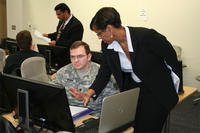Are you looking for a new way to spend quality time with your family? Is there a cause one of your relatives cares about that you'd like to support? Would your family enjoy meeting new people in your community? Does it feel like your family's priorities are getting out of whack? If so, volunteering together may be perfect for you.
Benefits of family volunteering
When families volunteer together, communities get more hands for important projects, and family involvement often translates to dedicated, reliable attendance. And when one family volunteers, it can provide a tremendous example, fostering a sense of community responsibility and perhaps even mobilizing other families to contribute their time and skills toward improving the community.
Families themselves get a whole slew of benefits from community service. Volunteering can draw family members closer together, forging new bonds through shared experiences outside normal day-to-day routines. Parents, children and other relatives who volunteer together also learn more about each other while experiencing new activities. New friendships and interests may form that can stay with the family long-term.
At a basic level, volunteering as a family is a concrete way to apply and demonstrate shared values and beliefs while making a positive impact on your world.
Common family volunteering opportunities
Many common volunteer opportunities lend themselves readily to family involvement. Convene a family meeting and discuss what areas you are all most interested in working together on. Day long environmental clean ups give your family a chance to enjoy the outdoors together while doing something positive for the planet.
Volunteering at a homeless shelter, a food bank or a soup kitchen can not only help the needy in your community, but can also remind your family how fortunate they are to have each other. If a family member is planning to participate in a walk-a-thon or another charity fundraising event, get the rest of the family involved if possible, handing out water to racers or programs to attendees at a dinner ball, for instance.
Many schools, nonprofits, churches and community groups offer countless opportunities for the whole family to volunteer together in a range of activities, from coaching sports or visiting residents at a retirement home or assisting in a toy drive. These local resources may also be able to assist you in coordinating an "adopt-a-family" relationship in which your family helps a recently arrived immigrant, refugee or less fortunate family adjust to the ins and outs of life in your community.
Your family can also create your own volunteer activities. Perhaps you can rake an elderly neighbor's lawn or help a low-income family paint their house. While some volunteer positions involve a longer commitment, many opportunities suitable for families are short-term or one-time events.
Define family as you see fit
Remember that you and your loved ones should decide what you call your family. Volunteering with an organization that doesn't accept your definition will likely create a situation unacceptable for your family. And although there's nothing wrong with your whole nuclear or extended family coordinating a volunteer outing, other combinations are also possible and may be easier to manage - especially if your family wants to take on a recurring role in the community.
For instance, a grandmother and grandson might join each other on a project all their own, or a group of cousins might team up once a month. Members of divorced families may find a renewed sense of continuity in their relationships by regularly volunteering together. Volunteer opportunities are available that fit families of all shapes and sizes. And why limit it to one family? See about getting your neighbors and friends involved too.






















